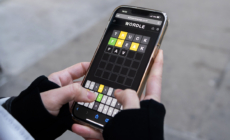-
Former WWE Champion Addresses Potential Royal Rumble Return - 36 mins ago
-
Trump and Biden, Make the Hostages Your Priority - 38 mins ago
-
Costco Guys More Popular Than Roman Reigns, Says Former AEW Superstar - about 1 hour ago
-
Organized Looting Throws Gaza Deeper Into Chaos - about 1 hour ago
-
Today’s ‘Wordle’ #1,283 Answers, Hints and Clues for Monday, December 23 - 2 hours ago
-
Artists We Lost in 2024, in Their Words - 2 hours ago
-
John Cena vs Logan Paul ‘On The Table’ For WrestleMania 41: Report - 2 hours ago
-
Ron Eliran, Israeli ”Ambassador of Song,” Has a Bar Mitzvah at 90 - 3 hours ago
-
Phillies Predicted To Cut Ties With Trade Acquistion Austin Hays - 3 hours ago
-
Mets Likely To Sign Pete Alonso Amid Depleted First Base Market - 4 hours ago
My Student Asked if Trump Would Deport Her. I Struggled to Answer
The first thing one of my students in my morning homeroom said to me on Wednesday, November 6th was, “Mr. Shah, are all of the immigrants going to get deported?”
I honestly didn’t know what to say. This student is a 7th grader and is originally from Honduras.
It was my first conversation of the day, and I was still processing a range of emotions, blended with fatigue, the morning after a tense election night. I had to put my teacher hat on, and figure out what the right response was. I tried sticking to facts, “Some immigrants are deported every year, but most are not.”
“Then why is Trump saying he’s going to deport all of us?”
I was at a loss. She had seen lots of messages on social media that President Trump was going to deport all immigrants, regardless of legal status. She’d read messages like “get them out of our country” online. My students get a lot of their news from social media, YouTube, TikTok, and Instagram, chief among them.
Teachers have a responsibility not to share our political views because of the immense influence we wield over growing minds. At the same time, we have an equal responsibility to respond to questions with curated facts and prompted inquiries.
I didn’t really know what to say and middle schoolers distract easily, but I told her that immigration laws are really complex. In 2024, everything—even the weather— has become politicized. I couldn’t figure out how to thread that needle with the capacity I had, and I let out a small sigh of relief when my student was pulled away by a conversation with a friend before I had the chance to respond. But I still felt like a coward, and like I had let her down as a teacher.

Ronak Shah/Chip Somodevilla/Getty Images
I felt myself sinking into a pit of disempowerment. But I couldn’t imagine how my students felt. At least I had the power to vote. As an adult, I have a meaningful voice in the process of choosing who is in power. My students, on the other hand, are constantly governed by people they have no real power to elect. Policy choices and political narratives are constructed all around them, controlling what they eat, what social media they have access to, what schools are available, what their healthcare looks like.
Here’s the thing, though: immediately after this conversation, my room was filled with laughter, questions, and engaged exploration into science. The election came up at least 13 more times—one student asked me if I’d vote for him when he turns 35. But today’s topic of earthquakes was much more common. Students tested DIY seismometers to measure the magnitude of simulated tremors, and explained how construction and preparation can minimize damage even during a high-intensity quakes.
In other words, my students were looking to the future, and how they can play a role in making that future a better place.
I know it’s trite to say “our children are our future,” but I’ve never felt it so viscerally as I do today. I’m sure it’s just as true today as it has been for every generation. Even as they grow into their own minds and skins, they are acutely aware that they will replace us and inherit the world we’ve built for them. As this world is increasingly run by octogenarian world leaders, I feel them readying themselves, steeling themselves up for the work that lies ahead.
As the day went on, I felt my spirits lifting and my affect warming. I realized what a privilege it is to be able to work with young people at a time like this. I still had a range of emotions, but at least by the end of the day, one of them was hope.
Ronak Shah is a 7th grade science teacher in Indianapolis, U.S.
All views expressed are the author’s own.
Do you have a unique experience or personal story to share? See our Reader Submissions Guide and then email the My Turn team at myturn@newsweek.com.
Source link




















